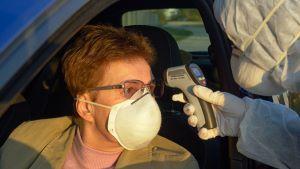COVID-19 Travel Checkpoints Spark Concern About Rights and Violations
 The number of COVID-19 cases in the United States is increasing by the day, and some states have started to take more serious measures to prevent the spread of the infection. A majority of the states in the country have some sort of quarantine or stay-at-home order that prohibits people from leaving their homes except for work or travel that is deemed “essential.” In an unprecedented development, some states have even begun to implement coronavirus checkpoints to screen travelers as they come in and out of the state. Those who are planning to travel should be sure to understand their rights and be aware of the potential criminal consequences they could face for a violation.
The number of COVID-19 cases in the United States is increasing by the day, and some states have started to take more serious measures to prevent the spread of the infection. A majority of the states in the country have some sort of quarantine or stay-at-home order that prohibits people from leaving their homes except for work or travel that is deemed “essential.” In an unprecedented development, some states have even begun to implement coronavirus checkpoints to screen travelers as they come in and out of the state. Those who are planning to travel should be sure to understand their rights and be aware of the potential criminal consequences they could face for a violation.
Checkpoints Intend to Stop Spread of Coronavirus
Some states are stopping all vehicles that have out-of-state license plates and requiring them and their passengers to sign a form promising that they will self-quarantine for 14 days. Rhode Island, Florida, and Texas are also requiring travelers to provide an address where they will quarantine and a warning that they could be subject to an unannounced follow-up visit from public health officials at any time. Those who violate the quarantine requirements could face fines or even criminal charges.
States are still allowing travelers to enter and have not denied anyone entrance, though some smaller communities have. The Florida Keys and the Outer Banks in North Carolina have begun to deny non-residents entry into their communities. Everyone who tries to get into these communities is asked for their ID. Unless they have a local address or other proof of residency, they are denied entry.
Some Have Questioned the Constitutionality of These Traffic Stops
Restrictions on travel have led to increased frustrations during this difficult time, especially for those who are already struggling with financial difficulties due to the pandemic. In response to these checkpoints, a lawsuit has been filed against a county in North Carolina by six out-of-state residents who stated that these policies are preventing them from getting to their vacation homes or rental properties. In Rhode Island, the ACLU has stated that traffic stops in and out of the state were initially only conducted on vehicles with New York license plates, though the practice has now been expanded to all out-of-state license plates.
Contact a Hartford Criminal Defense Attorney
In these uncertain times, it can be difficult to navigate the changing laws and the restrictions that different government organizations are putting in place. While the measures that have been implemented in many jurisdictions are meant to help stop the spread of the coronavirus, they can also infringe upon your rights as a U.S. citizen. If you are facing potential criminal charges related to coronavirus restrictions, you should speak with a Connecticut criminal defense lawyer as soon as possible. The Woolf & Ross Law Firm, LLC can help you understand your rights and provide you with the defense you need. To schedule a free consultation, call our office today at 860-290-8690.
Sources:
https://www.washingtonpost.com/local/trafficandcommuting/covid-19-checkpoints-targeting-out-of-state-residents-draw-complaints-and-legal-scrutiny/2020/04/14/3fc0ed42-774e-11ea-b6ff-597f170df8f8_story.html
https://www.abajournal.com/news/article/covid-19-checkpoints-at-state-and-local-borders-bring-lawsuit-aclu-warning
https://www.nytimes.com/2020/03/28/us/coronavirus-rhode-island-checkpoint.html






